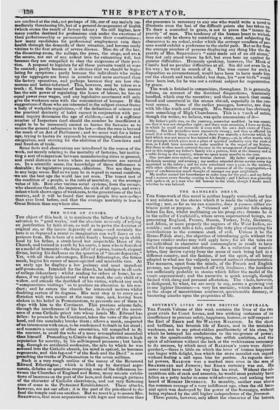THE GAMBLER'S DREAM.
THE framework of this novel is neither happily conceived, nor has it any relation to the stories which it is made the vehicle of pre- senting ; nor, so far as we can conceive, does it possess either ex- trinsic point or purpose. A "cleaned out" gambler falls asleep before his fire, whilst meditating on his prospects; dreams he is in the cellar of Crockford's, where seven supernatural beings, re- presenting England, France, Russia, Turkey, Italy, Germany, and Africa, or more properly the negroes of the West Indies, as- semble; and each tells a tale, under the trite plea of narrating his contributions to the common stock of evil. Unless it be the Russo-Polish story, the objection of introducing gods without the dignus vindice nodas may well apply here; for all the tales are too individual in character and commonplace in result to have called for supernatural interference. As a collection of nouvel- lettes, they derive variety from the scene of each being laid in a different country, and the fashion, if not the spirit, of all being adapted to what are the vulgarly received national characteristics. The manners, apart from the minds, of the French and English persons, are frequently touched off with liveliness ; the incidents are sufficiently probable in stories which follow the model of the comic supernatural; and the narrative is quick enough, though dashed with slang and personal affectation. The whole, however, is disfigured, by what, we are sorry to say, seems a growing vice in our lighter literature—a very lax morality, which shows itself in the shape of meretricious sentiment, questionable decency, or bantering attacks upon the proprieties of life.


























 Previous page
Previous page